Supporting Food Security, Hygiene, and Sanitation for Refugees and Returnees in South Sudan
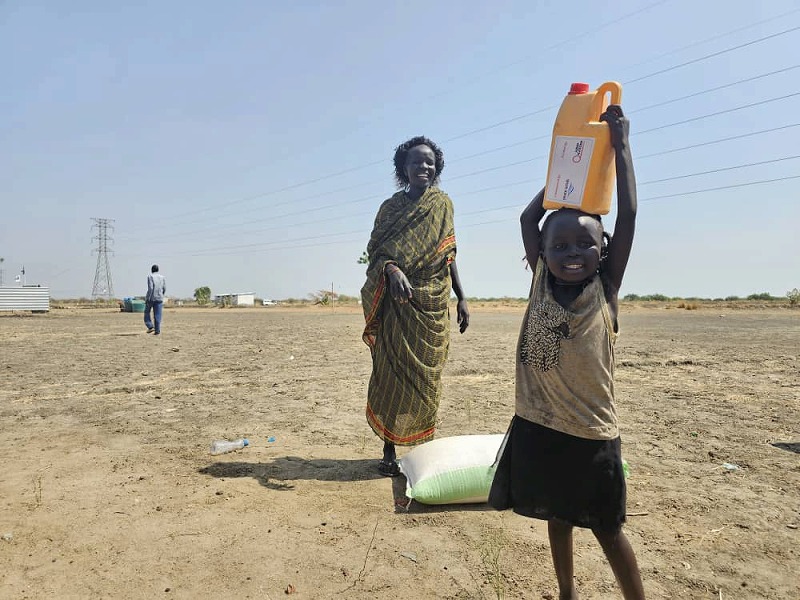
Food distribution for returnees in Melut County
April marked one year since the start of the Sudan Crisis, and in that time, nearly 140,000 refugees have fled to neighboring South Sudan. As the influx of refugees continues, many more are expected to arrive this year. Many Sudanese refugees are settling in camps which were originally established to host evacuees from other neighboring countries such as Ethiopia, Chad, and the Democratic Republic of Congo. However, refugees from Sudan now make up the majority in some camps, and many of these settlements are dangerously overpopulated.
In addition to accepting refugees from Sudan, parts of South Sudan are seeing an influx of returnees. These are individuals originally from South Sudan who were living in Sudan as refugees, but after being affected by the Sudan Crisis, they are now returning to their home country.
Some of the greatest challenges facing refugees and returnees in South Sudan include food security and sanitation. Peace Winds is working in Melut County, Upper Nile State and in Gorom Refugee Settlement near Juba to address some of these needs.
Food Distribution for Returnees in Melut County
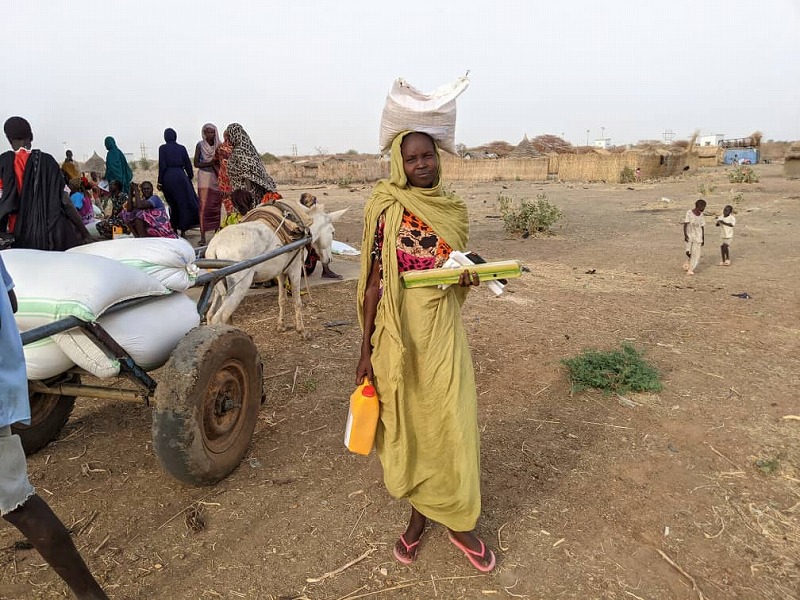
Beneficiaries receive food packages in Melut County
Food distribution is not only a matter of food security but also of health and protection for vulnerable groups. Malnutrition lowers immunity and increases the risk of contracting infectious diseases. This is especially problematic in overcrowded areas where sanitation is poor and medical care is limited, including many of the areas where South Sudanese returnees are living. Furthermore, women and children are at an increased risk of experiencing gender-based violence when trying to obtain food where it is scarce.
In March, Peace Winds conducted emergency food distribution for South Sudanese returnees in Melut County. Each household received food packages containing sorghum, beans, salt, and oil, according to World Food Program guidelines. Food packages also included soap and informational leaflets with tips on basic hygiene for displaced people, as well as information on ways to prevent and deal with sexual assault and other gender-based violence. Leaflets included illustrations so that everyone, including those who have difficulty reading and writing, is able to understand the information about hand washing and practicing good hygiene.
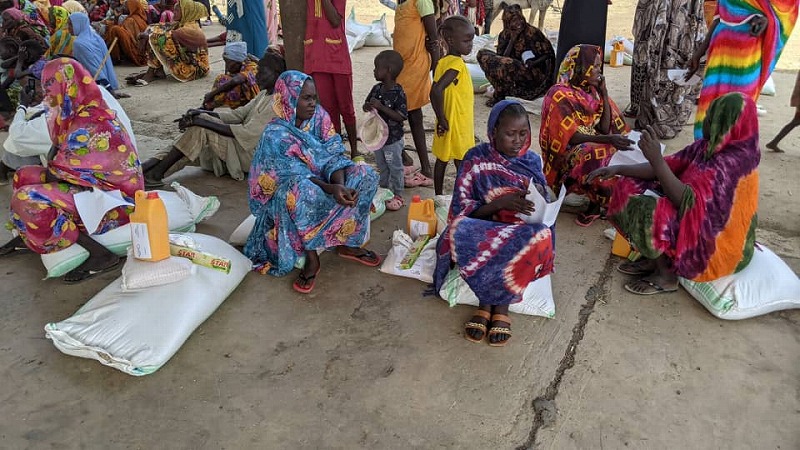
Women in Melut County receive food aid
Sanitation and Hygiene Activities in Gorom Refugee Settlement
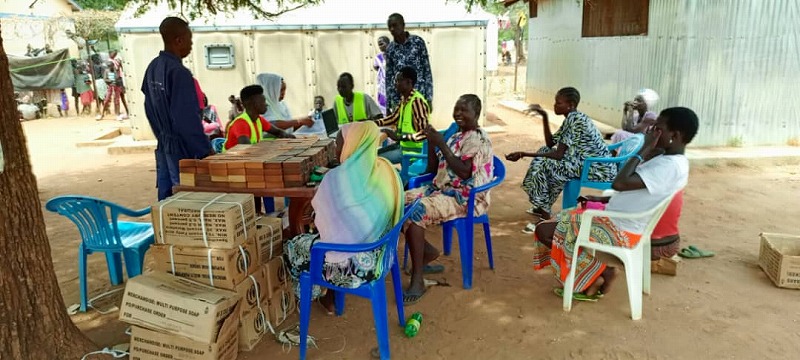
Distribution of soap to refugees
Sanitation is also a challenge in Gorom Refugee Settlement. The camp was originally designed to accommodate roughly 2,000 refugees, but it has exploded in size over the past year and now houses more than 14,000. This includes more than 10,000 Sudanese refugees who have made the harrowing journey to flee fighting in their country. Peace Winds continues to work with UNHCR to improve sanitation and hygiene conditions in a number of ways.
As there is no proper garbage disposal in many refugee settlements, including Gorom, garbage is thrown everywhere, leading to insect infestations and foul odors. Part of Peace Winds’ programming includes introducing regular garbage collection and encouraging residents to properly dispose of waste. In January, Peace Winds organized a group of Gorom residents to serve as Community Hygiene and Nutrition Workers. They have launched a hygiene awareness campaign, which included working with fellow refugees to clean up garbage in the camp and increase awareness of maintaining proper sanitation habits.
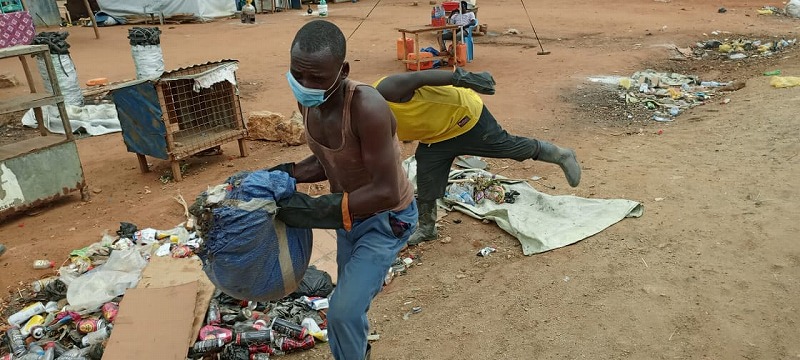
Garbage cleanup in Gorom
Another issue in Gorom is the matter of toilets. Pit toilets are common in refugee settlements. If these are not regularly emptied, they cannot be used, and this leads to additional problems. During the rainy season, the rain can cause an overflow of excrement, increasing the risk of infectious disease spread. In addition to regular pumping, Peace Winds is working to dismantle and disinfect toilets that are already full.
Open defecation is another widespread issue in camps such as Gorom due to a lack of toilets. This not only increases the risk of infectious disease transmission, but also the risk of gender-based violence, especially for women and children who have to disrobe outside. In response to this, Peace Winds built latrines throughout the camp and at the camp primary school in 2023, but more are still needed. A lack of awareness about proper toilet use is another cause of the problem. In addition to constructing toilets, Peace Winds is providing support that brings about changes in people’s awareness and behavior, such as with the issue of garbage disposal.
The Community Hygiene and Nutrition Workers are helping educate Gorom residents about proper toilet use, and they are also distributing soap to every household. Peace Winds is working with beneficiaries to encourage them to wash their hands with soap, do laundry, and keep the environment clean on a regular basis.
Peace Winds’ programs in South Sudan are made possible by grants from the Japan Platform and UNHCR, as well as by contributions from individual donors. We are grateful for your continued support.
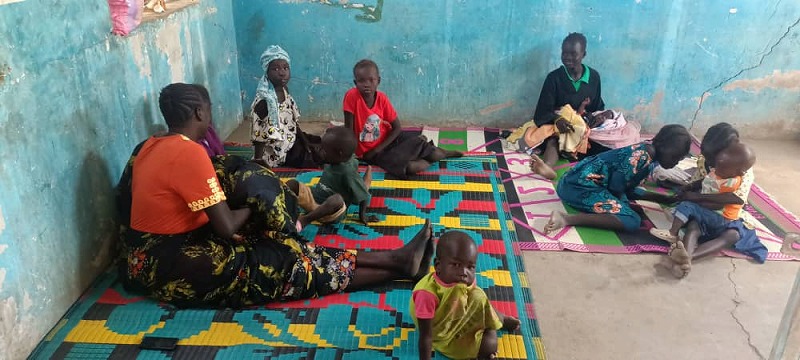
Returnee family in Melut County